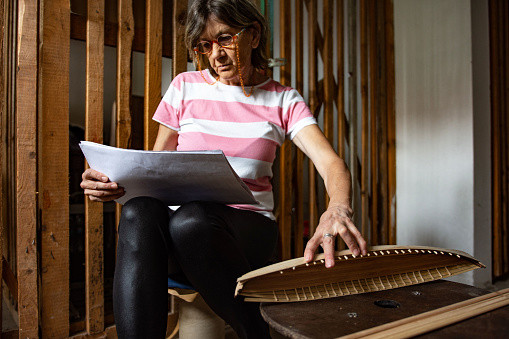
The skilled craftsmen from Villa Progreso, a town in central Mexico, are engaged in a determined effort to protect the art of creating handmade items using "ixtle," a natural fiber derived from the "henequen" plant, a type of agave.
This fiber is skillfully transformed into ropes, garments, decorative pieces, bags, baskets, and even piñatas, among other diverse objects.
Although ixtle cords were widely employed by ancient civilizations in Mesoamerica, they continue to be an integral part of Mexican households today, serving as clotheslines and equine accessories.
Mexican families have upheld the tradition of utilizing ixtle, a fiber that was widely employed by indigenous cultures in pre-Columbian eras, in the form of cords or straps.
These versatile ixtle cords serve multiple purposes, serving as both clotheslines and essential components of horsemanship equipment, reflecting the enduring cultural practices of the region.
"I've been doing this job ever since I can remember, since I was 5. Ever since I was little, my parents taught me to do this job and before I went to school (each day) I worked on this first. We got up at 3 am to (take care of it)," Abraham Mayorga Castillo, a member of one of the few families that still work with ixtle said.
Among the 11 children in his family, Abraham stood out as one of the nine who chose to carry on the family trade, La Prensa Latina reported.
He embarked on a journey alongside his father and grandfather, exploring various Mexican states to acquire valuable knowledge about product sales and customer engagement.
Remarkably, even after more than 40 years, many of the customers they encountered during their travels continue to support and purchase Abraham's products.
"I feel happy with what my parents taught me (in terms of) values (and) work," he said.
"I think my childhood was fun and it was unique because back then there wasn't as much as there is now. Now, young people don't want to learn how to do this work, (to make) handicrafts," he said.
For centuries before the Spanish conquest, the indigenous Mexica people and other groups were actively involved in crafting practical items from ixtle.
Today, Abraham's family represents the fifth generation committed to the production of rope made from this natural fiber.
However, the trade is, unfortunately, fading away as the knowledge and interest in ixtle craftsmanship diminish.
The primary challenge faced by Abraham's family and others in the trade is maintaining competitiveness in the market for such products.
"There was a time when cotton and plastic came in and they knocked us down in our work, but we've stayed in the market," he said.
Fren, Abraham's brother, shares the same sentiment of sorrow regarding the decline of their traditional craft.
However, he acknowledges the challenging nature of rope making, where the sun is crucial as the artisan's greatest ally.
"Here, the entire town sustained its economy based on ... crafts that are made with ixtle. The entire town worked with it, but over time this (craft) is being lost or people emigrate and don't come back, and things like that," he said.
According to the pair, the production of ixtle-based products involves a series of intricate procedures that must be meticulously followed.
Crafting a rope alone takes several days, and the final step involves a collective effort, with all the siblings coming together to twist it.
Lupita Perez Montes, the mayor of Ezequiel Montes, highlighted the rich history of Villa Progreso, spanning over 400 years.
The town proudly preserves enduring traditions, including the preparation of ancestral Otomi-Chichimeca cuisine and the production of ixtle handicrafts.
"It's really an art, they have to remove all the fiber from the henequen stalk, they have to comb it, they have to hang it, then it's spun, and it's a whole process that really is also an experience," she said.
© 2025 Latin Times. All rights reserved. Do not reproduce without permission.



